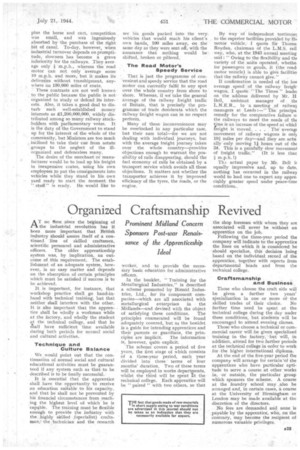Organized Craftsmanship Revived
Page 25

If you've noticed an error in this article please click here to report it so we can fix it.
Prominent Midland Concern
Sponsors Post-war Renaissance of the Apprenticeship
Ideal
A T no time since the beginning of 1-1, the industrial revolution has it been more important that British industry should assure itself of a continued line of skilled craftsmen, scientific personnel and administrative officers. The older apprenticeship system was, by implication, an outcome of this requirement. The establishment of an adequate system, however, is no easy matter and depends on the absorption of certain principles which must be satisfied if success is to be achieved.
It is important, for instance, that workshop practice shall go hand-inhand with technical training, but that neither shall interfere with the other. It is also important that the apprentice shall be wholly a workman while at the factory, and wholly the student at the technical college, and that he stall have sufficient time available during both periods for normal social and cultural activities.
Technique and Culture Balance We would point out that the continuation of normal social and cultural educational activities must be guaranteed if any system such as that to be described is to be finally successful.
It is essential that the apprentice shall have the opportunity to receive an education suitable to his capacity, and that he shall not be prevented by his financial circumstances from reaching the highest level of which he is 'capable. The training must be flexible enough to provide the industry with the highly skilled (specialist) craftsman,the technician and the research
worker, and to provide the necessary basic education for administrative officers.
In the booklet, "Training for the Metallurgical Industries," is described a scheme promoted by Birmid Industries, Ltd., for its component companies—which are all associated with metallurgical enterprises in the Midlands—and devised with the object of satisfying these conditions. The principles enumerated will be found adequately covered, but as the booklet is a guide for intending apprentices and their parents or guardians, the prin ciples are implicit. The information is, however, quite explicit.
The scheme covers a period of five years, the first stage of which consists of a three-year period, each year divided into three terms of four months' duration. Two of these terms will be employed in works departments, whilst the third will be spent It the technical college. Each apprentice will be " paired " with two others, so that
the shop foreman with whom they are associated will never be without an apprentice on the job.
Following the three-year period the company will indicate to the apprentice the lines on which it is considered he should specialize, this decision being based on the individual record of the apprentice, together with reports from departmental heads and from the technical college.
Craftsmanship and Business Those who choose the craft side will be given a further two years' specialization in one or more of the skilled trades of their choice. No further time need be spent at the technical college during the day under these conditions, but students will be encouraged to attend evening classes. Those who choose a technical or commercial career will be given specialized training in the factory, but will, in addition, attend for two further periods at the technical college in order to work for the higher international diploma.
At the end of the five-year period the company will arrange for certain 'of the apprentices who have particular aptitude to serve a course at other works in, or outside, the particular group which sponsors the scheme. A course at the foundry school may Also be arranged and, in certain cases, a course at the University of Birmingham or London may be made available at the discretion of the directors, No fees are demanded and none is payable by the apprentice, who, on the contrary, may become the recipient of numerous valuable privileges.




















































